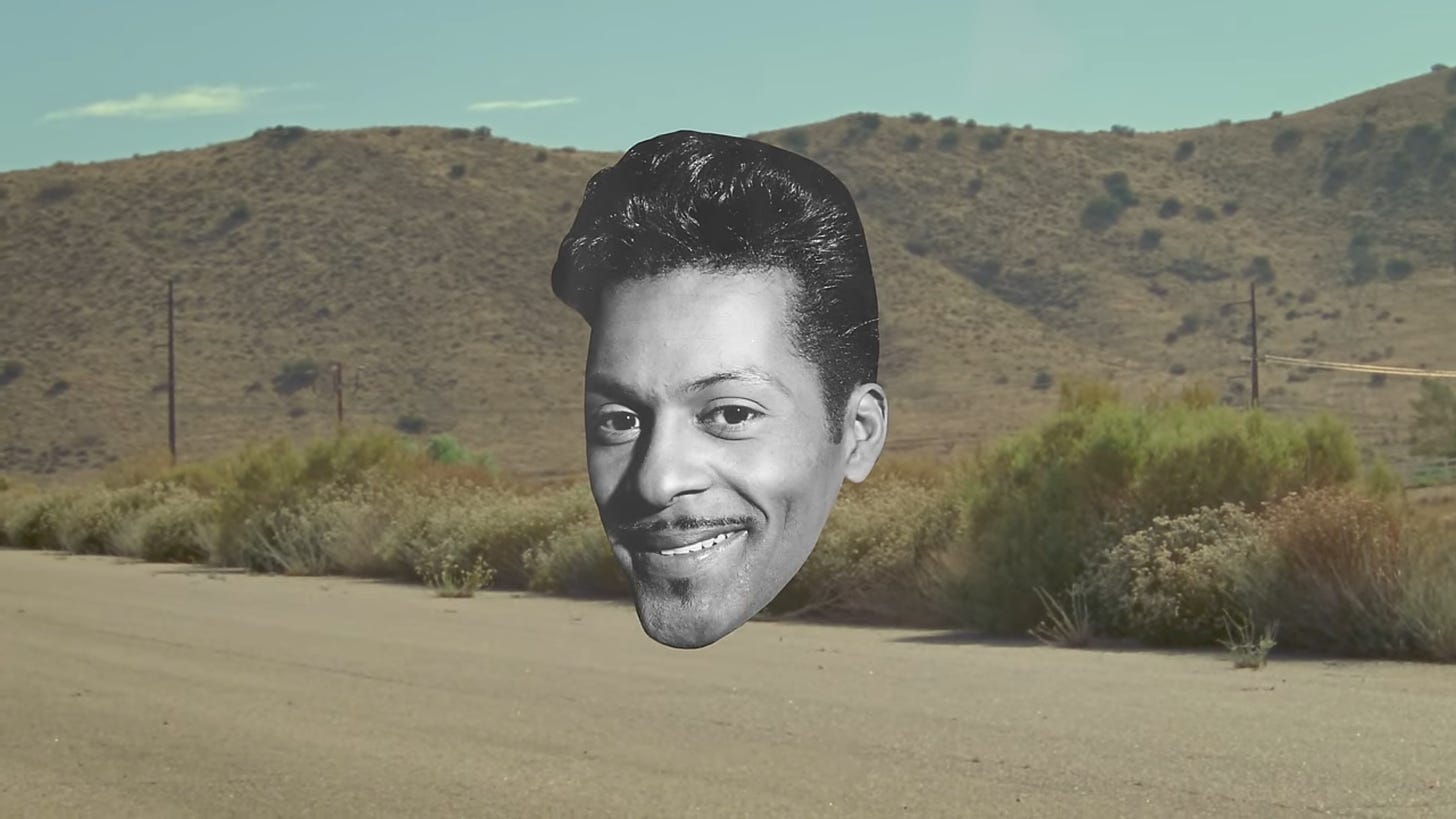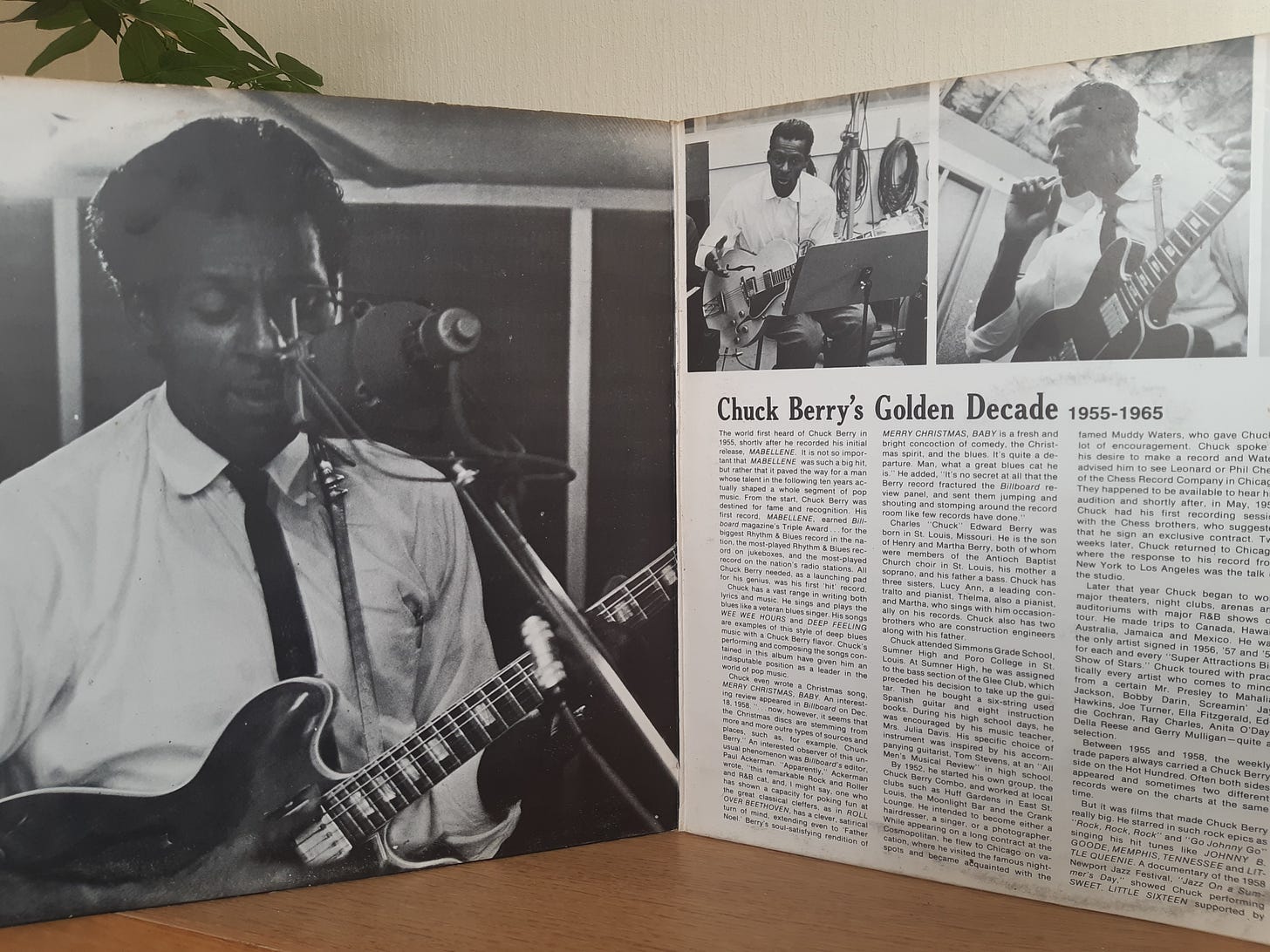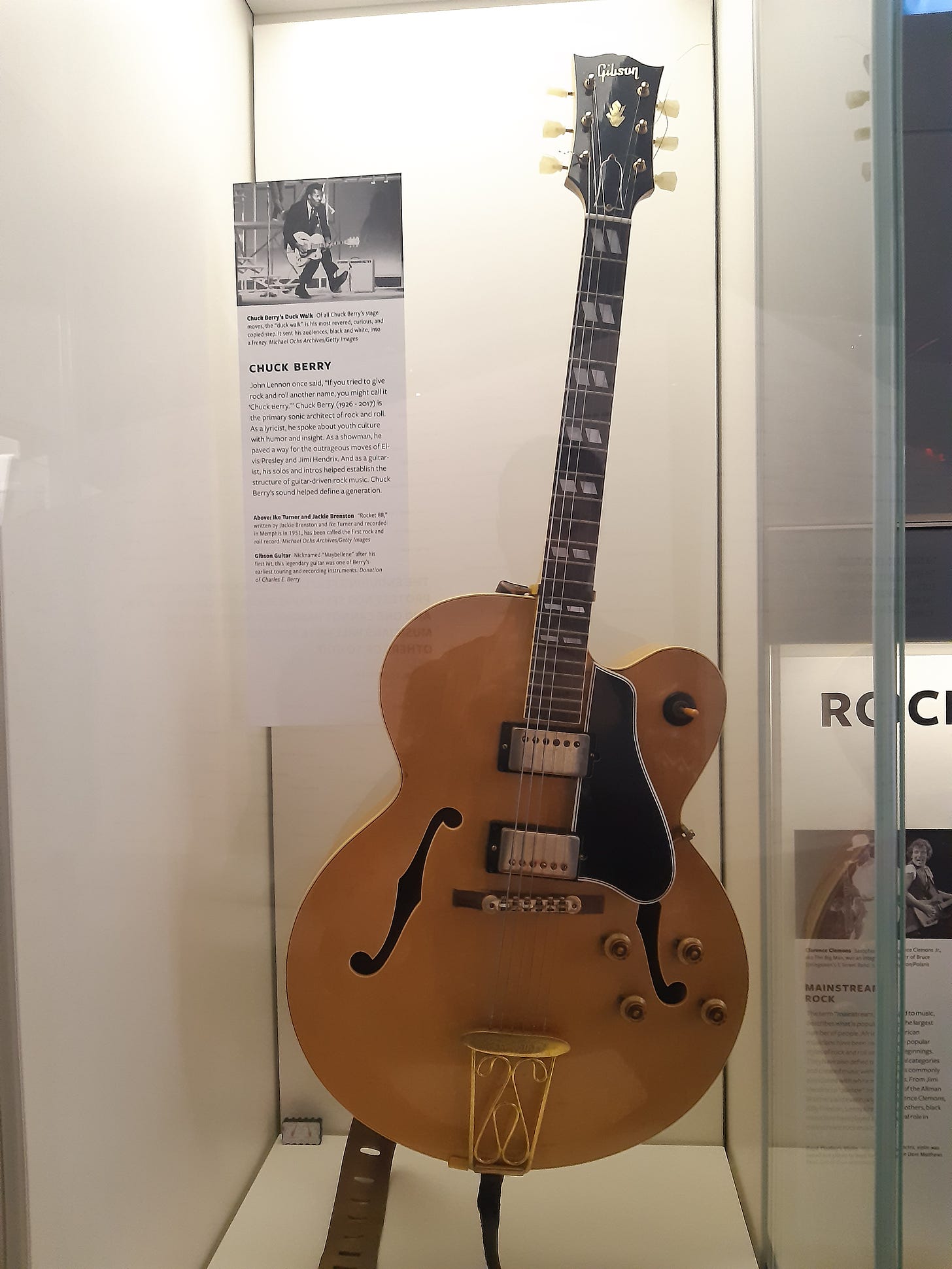The Country Stylings of Chuck Berry, via Beyoncé
"Oh Louisiana/I've stayed away from you too long..."
Author’s Note - In the interest of making this newsletter more accessible, I’m happy to to announce that each article will now include a voiceover! As well as this one, I have begun adding them to older articles too. They’re read by me, because all the Hollywood actors I asked were unavailable. I apologise in advance for tripping over my words from time to time, and assure you that these are the best of many, many attempts. Thanks for reading!
The biggest album to be released so far in 2024 has been Cowboy Carter, the much-anticipated country album by Beyoncé. This ambitious epic boasts an impressive cast of guest musicians: established folk/country musician and banjo historian Rhiannon Giddens; rising country stars like Reyna Roberts, Tiera Kennedy and Tanner Adell; superstar Miley Cyrus; and legends like Dolly Parton, Willie Nelson, and Linda Martell.
The guest musician I was most surprised to encounter on Cowboy Carter, however, was one who isn’t even alive anymore: Chuck Berry.
Chuck Berry is best known for being one of the originators of rock ‘n’ roll music in the 1950s. Being several decades too young to have experienced that first-hand, I first encountered Chuck shortly after being gifted a battered old record player in the early 2010s, when I found a copy of the compilation album Chuck Berry’s Golden Decade in a charity shop for £1.
Besides being the original ‘guitar hero,’ Chuck was arguably the first rock ‘n’ roll poet, his unique turn of phrase accentuated by his crystalline, Nat King Cole-esque phrasing. He also had several musical strings to his bow, equally comfortable with his trademark rockers (“Johnny B. Goode”), deep blues (“In the Wee Wee Hours”), Tin Pan Alley-inspired ballads (“Together We’ll Always Be”) and Latin music (“La Juanda”).
His rapid-fire delivery on tracks like “Too Much Monkey Business” and “Jaguar and Thunderbird” prefigures hip-hop, and occasionally he would produce something that defied categorisation altogether – like my favourite Chuck Berry track, the eerie and haunting “Havana Moon.”
Chuck remained active all the way up to his death in 2017, but for me his true magic is contained within that “golden decade” from 1955-65, when he was usually accompanied by his musical kindred spirit Johnnie Johnson on piano.
Chuck Berry appears twice on Cowboy Carter: first on track 6, where his song “Maybellene” is briefly heard, and then again on track 21, which is a pitch-altered segment of “Oh Louisiana” from his 1971 album San Francisco Dues.
These samples might seem random, but they’re very deliberate. Chuck – much like Beyoncé herself – has strong country roots. Berry grew up listening to country on the radio in St Louis, and writes in his autobiography that he gradually sprinkled country songs into his earliest live sets. His rhythm and blues-loving audience initially didn’t care for it, but gradually they came around, so much so that these songs quickly became the high points of his early concerts.
“Maybellene,” Chuck’s first single in 1955, was adapted from the country song “Ida Red” as performed by Bob Wills and His Texas Playboys. A 2002 essay entitled “Crossing Over: From Black Rhythm and Blues to White Rock ‘n’ Roll” by Reebee Garofolo (from the book Rhythm and Business: The Political Economy of Black Music, edited by Norman Kelley) notes that Berry recorded a version of “Ida Red” and presented it to three major labels, two of which turned it down for sounding “too country” for a black rhythm and blues artist.
Only Leonard Chess of Chicago’s Chess Records was interested, and suggested that Berry rework the song into what became “Maybellene.”
The song achieved crossover success on the country and western charts, leading some radio listeners to assume that Berry was a white country singer (“I didn’t know Chuck Berry was black for two years after I heard his music,” said Keith Richards, Chuck’s most famous disciple, in his 2010 autobiography).
This misconception is depicted in the 2008 film Cadillac Records (which, incidentally, was executive produced by Beyoncé, who also stars as Etta James), where Chuck (played by Mos Def) and his band are turned away from a club because the owners refuse to believe that he is “country and western singer” Chuck Berry.
Berry’s contemporary Jimmy Witherspoon – another artist who moved freely between different genres, in his case blues and jazz – offered his opinion of Chuck’s country credentials in Arnold Shaw’s 1978 book Honkers & Shouters.
“Chuck Berry is a country singer,” said Jimmy. “People put everybody in categories, black, white, this. Now if Chuck Berry was white, with the lyrics he writes, he would be the top country star in the world.”
Here is Chuck playing pedal steel guitar, an instrument synonymous with country music, over the end credits of the 1987 documentary film Hail Hail Rock ‘n’ Roll. (You can also hear him playing steel guitar on tracks like “Deep Feeling” and “Cryin’ Steel.”)
Today, Chuck Berry is celebrated, despite his famously cantankerous personality, reputation for unpredictable live performances (he often toured without a band, hiring pickup musicians from town to town) and a personal life that can kindly be described as complex.
On a visit last year to the amazing National Museum of African-American History and Culture in Washington D.C., I was both happy and amused to see one of Chuck’s beloved Cadillacs on display as part of the wonderful Musical Crossroads exhibition.
Amused, because I remember the scene in Hail Hail Rock ‘n’ Roll where Berry complains that people keep making low-ball offers for his cars – he states that he’ll happily hold onto his fleet of Cadillacs for another 20 years, if that’s how long it takes for someone to come up with the required $50,000.
Sure enough, Smithsonian Magazine reported that the museum had a hard time getting Chuck to part with the car. Arriving at Berry’s home to negotiate the acquisition of the vehicle and other items, museum historian Kevin Strait was greeted by a smiling Chuck who cheerfully informed him, “I’m not giving you a single thing.”
Incredibly, Strait was eventually able to persuade Berry (without giving him $50,000) to donate the Cadillac plus one of his trademark Gibson guitars, by reminding Chuck of the good it would do for his legacy.

All of this is to say that I’m happy that Chuck Berry shows up on Cowboy Carter, just as I’m happy when he shows up anywhere. And with Beyonce’s next album rumoured to be a rock record, maybe Chuck will show up there too.







That was 9 minutes of my time well spent. Really detailed and connected together with musical interludes to heighten the atmosphere. Very very interesting Tim